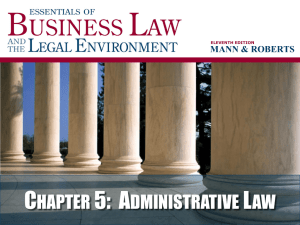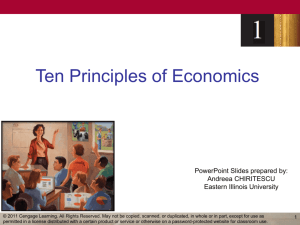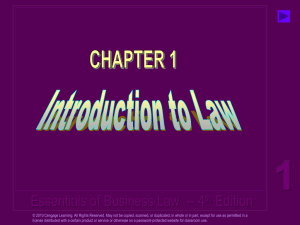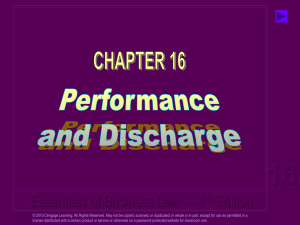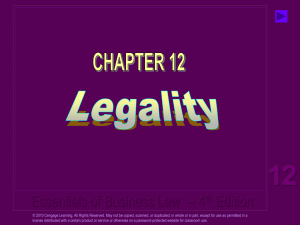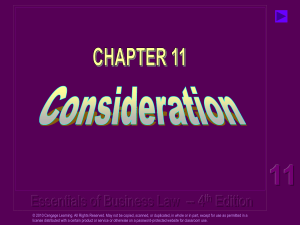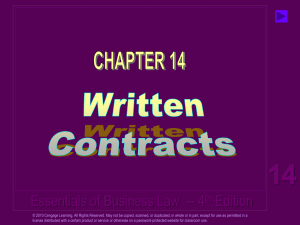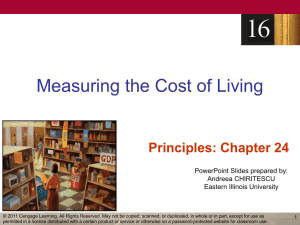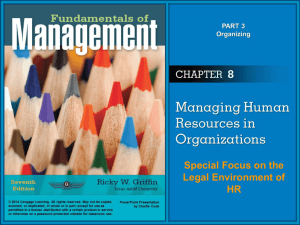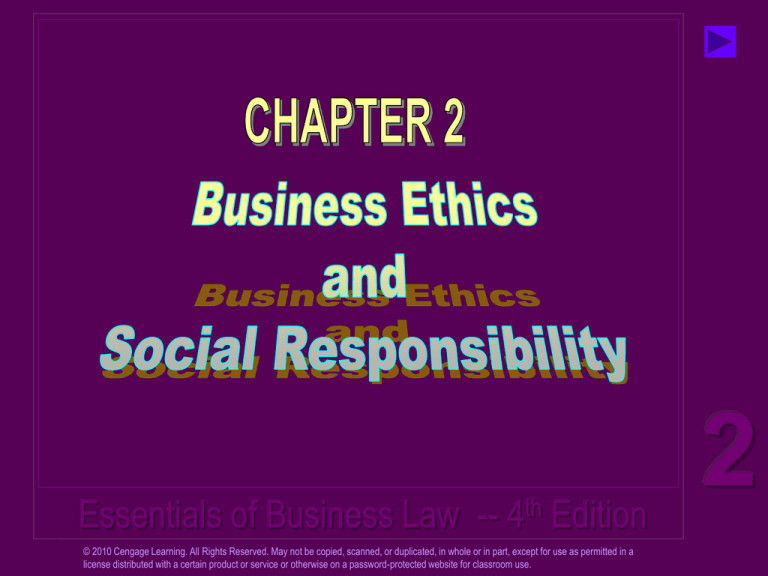
Essentials of Business Law -- 4th Edition
© 2010 Cengage Learning. All Rights Reserved. May not be copied, scanned, or duplicated, in whole or in part, except for use as permitted in a
license distributed with a certain product or service or otherwise on a password-protected website for classroom use.
2
Click your mouse
anywhere on the
screen when you are
ready to advance the
text within each slide.
After the starburst appears behind the blue
triangles, the slide is completely shown.
You may click one of the blue triangles to
move to the next slide or the previous slide.
Essentials of Business Law -- 4th Edition
© 2010 Cengage Learning. All Rights Reserved. May not be copied, scanned, or duplicated, in whole or in part, except for use as permitted in a
license distributed with a certain product or service or otherwise on a password-protected website for classroom use.
2
“The one and only social responsibility of
business is to increase its profits.”
Milton Friedman (b. 1912),
Nobel laureate in economics
“The business of business is serving
society, not just making money.”
Dayton Hudson corporate constitution
Essentials of Business Law -- 4th Edition
© 2010 Cengage Learning. All Rights Reserved. May not be copied, scanned, or duplicated, in whole or in part, except for use as permitted in a
license distributed with a certain product or service or otherwise on a password-protected website for classroom use.
2
Ethics is the study of how
people ought to act.
Law and ethics may not always agree...
• Sometimes it is ethical to commit an illegal
act...
• And some legal acts are unethical!
Essentials of Business Law -- 4th Edition
© 2010 Cengage Learning. All Rights Reserved. May not be copied, scanned, or duplicated, in whole or in part, except for use as permitted in a
license distributed with a certain product or service or otherwise on a password-protected website for classroom use.
2
There is little evidence that ethical behavior
increases profits or that unethical behavior
decreases profits… so why bother?
Society as a whole benefits by encouraging
economic competition; no one wants to
compete with unfair competitors.
People feel better when they behave ethically.
Unethical behavior can be costly, if there is
public outrage leading to a boycott.
Essentials of Business Law -- 4th Edition
© 2010 Cengage Learning. All Rights Reserved. May not be copied, scanned, or duplicated, in whole or in part, except for use as permitted in a
license distributed with a certain product or service or otherwise on a password-protected website for classroom use.
2
What are the facts?
What are the critical issues?
Who are the stakeholders?
What are the alternatives?
What are the implications of each choice?
•
•
•
•
Are the alternatives legal?
Do they “look bad?”
What are the consequences of this choice?
Does this action violate important values?
Is more than one alternative right?
Essentials of Business Law -- 4th Edition
© 2010 Cengage Learning. All Rights Reserved. May not be copied, scanned, or duplicated, in whole or in part, except for use as permitted in a
license distributed with a certain product or service or otherwise on a password-protected website for classroom use.
2
Alternatives in advertisement ethics
• Ignore ethics and try to create ads that sell the
most product, no matter the underlying
message.
• Try generally to minimize exploitation.
• Include a systematic, focused review of
underlying messages as part of the
development process.
• Refuse to create any ads that are even
potentially offensive.
Essentials of Business Law -- 4th Edition
© 2010 Cengage Learning. All Rights Reserved. May not be copied, scanned, or duplicated, in whole or in part, except for use as permitted in a
license distributed with a certain product or service or otherwise on a password-protected website for classroom use.
2
To customers
• Privacy issues are controversial -- can a business
sell lists that include your address? Your phone
number? Your sexual preference?
To employees
• Employers must take reasonable measures to
ensure the safety of workers.
• Decisions about firing workers or cutting jobs raise
ethical questions.
To shareholders
• Questions are often raised about uses of a
company’s profits -- distributed to shareholders,
raising executives’ salaries, improving business?
Essentials of Business Law -- 4th Edition
© 2010 Cengage Learning. All Rights Reserved. May not be copied, scanned, or duplicated, in whole or in part, except for use as permitted in a
license distributed with a certain product or service or otherwise on a password-protected website for classroom use.
2
To -- and in -- foreign countries
• Companies with operations in foreign countries are
often criticized for deplorable working conditions and
low wages.
• Response to these criticisms is often that even lowwage jobs are better than destitution and that these
jobs are the beginnings of economic growth.
Employees’ responsibility to organization
• Should employees report unethical behavior among
co-workers? Should promotion decisions be made
based on friendships?
• These questions show the difficult choices that have
to be made every day in the work place.
Essentials of Business Law -- 4th Edition
© 2010 Cengage Learning. All Rights Reserved. May not be copied, scanned, or duplicated, in whole or in part, except for use as permitted in a
license distributed with a certain product or service or otherwise on a password-protected website for classroom use.
2
Essentials of Business Law -- 4th Edition
© 2010 Cengage Learning. All Rights Reserved. May not be copied, scanned, or duplicated, in whole or in part, except for use as permitted in a
license distributed with a certain product or service or otherwise on a password-protected website for classroom use.
2


